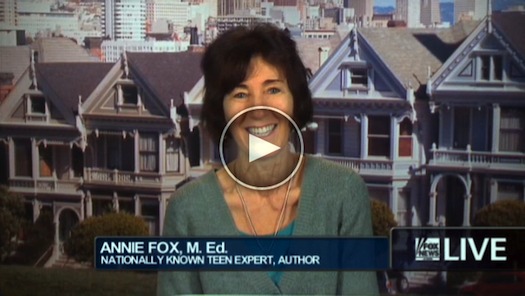
Almost ready for my close-up
Tuesday morning was not typical. Before 8 o’clock I had my professional act in gear (make-up, hair, couture… such as it is) and took my show on the road. Twenty miles south, David and I pulled up to FoxNews.com’s San Francisco studio and into a parking spot six steps from the front door.
I’d been invited to Fox (no relation) to offer my expert opinion about the choice of some parents to permit their teens to have sex in the family home. What did I think about this trend? Truthfully, I hadn’t heard about it. But I take these assignments seriously so I did my research. Rule of thumb: If you’re going to put yourself out there as someone who knows what she’s talking about, it’s best to try to sound like you know what you’re talking about.
Here’s a 6 min clip of my interview with Jonathan Hunt, a thoughtful interviewer with good questions, a good sense of humor, and good listening skills.
In case you’d rather read than watch the video (though you can do both for the same ridiculously low price… free) here’s the big take-away:
Parents are hard-wired to keep their kids safe. Any hint of a threat to the young ‘un and our inner Mama or Papa Lion instantly reacts. No thinking involved, which is kinda perfect since over-analyzing in an emergency can get in the way of surviving. But not everything parents perceive of as threatening is actually a threat and an over-the-top reaction can be counter-productive. (Like when you encourage your teen to come to you with any questions and when they ask about sex or drugs, you totally freak out thus shutting down all conversation and insuring (s)he won’t be coming back to you with important stuff any time soon.)
Thankfully our brain also specializes in rational thought. The long-term, rational approach to parenting says our #1 objective is to raise a fully functioning independent young adult. That’s why we’ve got to teach our kids to analyze situations. And to make healthy choices. That’s the only way they can keep themselves safe when we’re not around, which is going to account for most of their lives unless you’re planning on having them live with you forever, in which case we need to talk.
Mr. Hunt quoted this statistic: “By their 19th birthday 70% of young people have had sexual intercourse.”
Translation: They’re going to do it anyway, so why not let them do it in the family home rather than a car or in the park, since it’s safer? Or do you think that’s just off-the wall?
There are enough Parent Police out there judging the way other folks raise their kids and I’m not going to join the squad. How you, as a parent, educate your children about sex is a personal decision. But, the reality is; older teens will be doing it.
Wherever you stand on this issue, here’s my advice (again free for the taking):
- Talk about relationships rather than just the “yes” or “no” of teen sex. Talk about sex in context of a relationship, rather than hooking up. If you don’t know where you stand on teen sex or you’re conflicted, that’s honest. Tell your teens that. But remember that you have a leadership role. If you want to transmit your thoughtful values to your teen (as opposed to “Just say no.”) then spend some time thinking about what those values are and why you hold them.
- It’s not just one talk. Have a series of conversations. Treat teens with respect. Talk less and listen more. That’s the only way you can find out where they are coming from, what assumptions they have about relationships, etc. There are endless opportunities to have conversations while you’re watching TV, after a movie, reading the news, listening to song lyrics, etc. It’s very important that the parent’s voice is in a teen’s head. You’re not going to be the only voice in there, but you want to be part of the mix and parental influence is powerful.
- Be realistic. Sex is part of life for adults and for older teens. In the context of a healthy relationship (the only kind worth having) it’s a joy. Parents who are in denial about teens and sex remain silent and their teens remain uninformed. Some people believe that talking to teens about sex encourages them to become sexually active… right now! Just the opposite is true. Studies show that teens whose parents provide them with reliable information actually wait longer to have sex and are more likely to use protection when they do have sex.
At some point, your teen will decide that (s)he’s ready to have sex. You want the decision to be made from a basis of self-knowledge and information coupled with values. You also want that information and those values to come from you. If you don’t talk to your teens about sex and healthy relationships (mutual trust, respect, etc.), where do you imagine they’ll get their information and values from? Probably from their clueless friends. Not a comforting thought.













You did your homework well – I like your perspective. I often look for your tweets and pass them on to my readers. Keep up the good work, Phyllis
Comment by Phyllis Goldberg, Ph.D. — July 22, 2011 @ 9:36 pm
As the mom of four teens, this is obviously a subject on my radar. As a fairly conservative person, I would like for them to wait until they are married. As a social worker that works with teenage mothers, I am also a realist. However, the rule is no sex in our home. My reasoning is more that I don’t want the two oldest (19, 18) to influence the younger two in terms of sexual behavior (15, 13). I could be completely misguided but this is the decision the hubby and I made.
Comment by Melissa — July 23, 2011 @ 5:13 pm
Thank you, Phyllis. I appreciate your taking the time to read and comment. Thanks for your interest in my work. Continued success with yours.
Comment by Annie — July 23, 2011 @ 5:17 pm
Melissa, the basis of your decision sounds reasonable to me.
Comment by Annie — July 23, 2011 @ 5:19 pm
Seems like this is a hot topic. Just read a relevant article in the New York Times about an upcoming book on the topic:
The Sleepover Question
Amy Schalet is an assistant professor of sociology at the University of Massachusetts, Amherst, and the author of the forthcoming “Not Under My Roof: Parents, Teens and the Culture of Sex.” http://www.nytimes.com/2011/07/24/opinion/sunday/24schalet.html?_r=1&emc=eta1
Comment by David Fox — July 24, 2011 @ 12:05 pm
Hello Annie~ My daughter is over 18 yrs now, my son is 22 (hard to believe!). With both my kids from an age appropriate age we always had open and matter fact discussions about sex, STD’s, birth control, sexuality, LOVE. The main point I always made with my kids… They should be making love with a partner in a committed relationship rather than having random “hook-ups.” My kids knew that their heart was a big part of sex and it is hard to get that back with rash decisions. Now that both my kids are sexually active.. the advice I give them? Our home is the sanctuary from S.A.D… S = Sex, A = Alcohol, D = Drugs. Meaning? They need a place to feel safe from the pressures of being a young adult so they can come home and not have any influence or memories from S.A.D. I want them both to feel comfortable coming home from whatever they have experienced and know that their home is a calming, comfortable place. If they are having sex.. make good decisions about birth control, the relationship they are in and of course a “safe” environment. And they can always, always talk to their parents about anything that is happening in their lives. It’s not about if or where they are having sex, and we can’t prevent it. It’s creating a sanctuary with all the doors of communication open…
Comment by Linda — July 27, 2011 @ 7:56 am
Hi Linda, what you’ve described is such a reasonable approach! I’m sure your kids greatly benefited from your guidelines and your open-door communication policy. Well done!
Comment by Annie — July 27, 2011 @ 8:11 am
way to go Annie. i watched. u were wonderful. keep on!
Comment by sana quijada — July 27, 2011 @ 10:25 am
i totally agreed w u on our goals to get teens to b their own advocates, their own friend. awesome
Comment by sana quijada — July 27, 2011 @ 10:27 am
Thanks for your encouragement and support, Sana. Much appreciated.
Comment by Annie — July 27, 2011 @ 1:10 pm
I really appreciate the emphasis on relationships and I agree with this being lead by the parents. Relationships are key and when this is the focus the “pressures” of kids “proving” themselves becomes larger than simply having sex.
As parents engage in multiple conversations there is also the modeling that is communicated to a teenager. All of this gets calculated in a growing and expanding mind which relates to the decisions being made.
Great post Annie! Thank you!
Comment by Matthew Kuehlhorn — August 1, 2011 @ 1:20 pm
Thanks, Matthew, for your encouragement and for the solid work you do on behalf of young people!
Comment by Annie — August 1, 2011 @ 1:36 pm
You did very well Annie, you sounded just like my wife. No wonder I like hanging out with you in cyber space. 😉
This is great stuff for using in class this year. I will have to bookmark so I can use it as a discussion starter.
Thanks!
Cheers,
Keith
Comment by Old School Parent — August 17, 2011 @ 3:04 pm
i totally agreed w u on our goals to get teens to b their own advocates, their own friend. awesome
Comment by Brad — August 24, 2011 @ 11:30 am